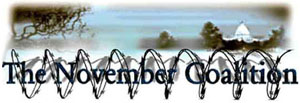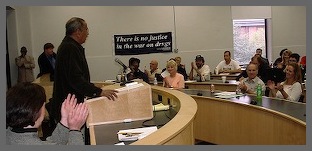
Rep. John Conyers launching Journey for Justice, Detroit, MI 2002
A speaker’s forum is a selected group of speakers addressing a public audience. Usually a moderator introduces them, and they talk for a specified number of minutes. A forum may feature one speaker, other times a group of speakers.
Ideally, the speaker(s) selected for a speaker’s forum or panel will offer listeners a blend of viewpoints about the meeting's purpose or agenda. Speakers should be selected carefully for what they know, and their ability to effectively teach on the subject. For instance, if the goal of the meeting is teaching people about drug mandatory minimums in your state, you should choose speakers who know about sentencing issues in particular.
If your goal is to present a project that involves the public, any experts addressing the audience should understand the project or campaign, and their role in convincing the public to participate. Make sure your speakers are well informed about such a project or campaign and committed to assisting.
If you're holding a general information meeting, speakers can be chosen for ability to share and teach an aspect of the broad and far reaching drug war. And it’s okay to ask an invited speaker to help meet your group’s goals.
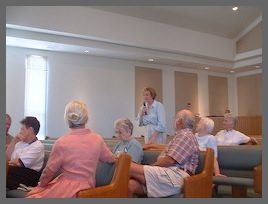
Journey for Justice: Phoenix, AZ 2003
If you want to plan a speaker's forum or panel discussion, your group will ask, "Who else locally might join others on a "panel?"
If there's a college in your area, you might find a criminologist who has become an expert on prison overcrowding. You may know someone with a loved one in prison who could speak about impact on families. Other possibilities: an experienced defense attorney, professional counselor, journalist, public health official, or religious leader.
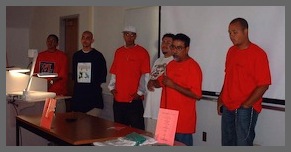
Get Stop Snitching Right Conference: Kansas City, MO 2007
As you plan the event's agenda with local volunteers, remember to schedule time for adequate discussion with the audience after scheduled speakers have concluded. Panel members should expect to hear comments from the audience, and address questions and concerns. If you hold a speaker's forum, plan for the same period of audience participation. This is very important.
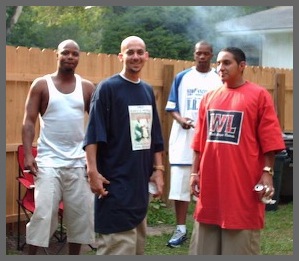
Musicians and Volunteers: Kansas City, MO 2007
A speaker's forum or panel is a public event. Study Bottoms Up chapters that teach how to publicize public events, create an informational table, and use checklists and timelines. Get contact information from people who show up, always. It's predictable that many people will sign up to be contacted when you host future events or planning meetings.
Remember: your objective is to attract an audience to hear and view the presentations. Within that scope are ways you can use a public event to recruit local members and volunteers.
Avoid inviting someone who may be disruptive to your agenda. For example: a local judge who sentences drug users to prison, the head of the drug task force, or the county prosecutor. A panel presentation or speaker’s forum is not a debate or contest. It’s okay to organize a debate, but don’t call it a forum, or expect one, if the 'opposition' is asked to join a ‘panel discussion.’
The audience at your panel event should enjoy a relaxed opportunity to hear and judge views on the subject, minus the atmosphere of competition that defines formal debates. Invited panel speakers should be at ease knowing they won't be facing off in a public forum with representatives of the opposing view sitting next to them.
Expect, however, that members of your audience might hold opposing views -- and can be given time to share them before the event is over. Organizers should plan enough time for questions, answers and comments.
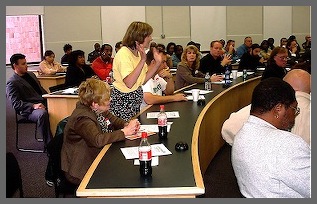
Journey for Justice: Detroit, MI 2002
Before closing, the moderator thanks all panelists and the audience for participating.
If you need a speaker, November Coalition may be able to help find an appropriate guest. Some possibilities include people featured here.
